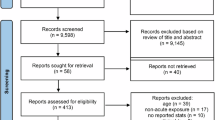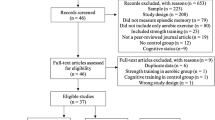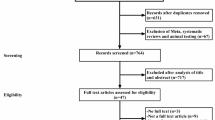Abstract
Extensive research links regular physical exercise to an overall enhancement of cognitive function across the lifespan. Here we assess the causal evidence supporting this relationship in the healthy population, using an umbrella review of meta-analyses limited to randomized controlled trials (RCTs). Despite most of the 24 reviewed meta-analyses reporting a positive overall effect, our assessment reveals evidence of low statistical power in the primary RCTs, selective inclusion of studies, publication bias and large variation in combinations of pre-processing and analytic decisions. In addition, our meta-analysis of all the primary RCTs included in the revised meta-analyses shows small exercise-related benefits (d = 0.22, 95% confidence interval 0.16 to 0.28) that became substantially smaller after accounting for key moderators (that is, active control and baseline differences; d = 0.13, 95% confidence interval 0.07 to 0.20), and negligible after correcting for publication bias (d = 0.05, 95% confidence interval −0.09 to 0.14). These findings suggest caution in claims and recommendations linking regular physical exercise to cognitive benefits in the healthy human population until more reliable causal evidence accumulates.
This is a preview of subscription content, access via your institution
Access options
Access Nature and 54 other Nature Portfolio journals
Get Nature+, our best-value online-access subscription
$29.99 / 30 days
cancel any time
Subscribe to this journal
Receive 12 digital issues and online access to articles
$119.00 per year
only $9.92 per issue
Buy this article
- Purchase on SpringerLink
- Instant access to full article PDF
Prices may be subject to local taxes which are calculated during checkout






Similar content being viewed by others
Data availability
Data used to support the conclusions of this study are available at the OSF repository: https://osf.io/e9zqf/.
Code availability
Codes used for the analyses presented here are available at the OSF repository: https://osf.io/e9zqf/.
References
Sallis, J. F. et al. Physical activity in relation to urban environments in 14 cities worldwide: a cross-sectional study. Lancet 387, 2207–2217 (2016).
Guiney, H. & Machado, L. Benefits of regular aerobic exercise for executive functioning in healthy populations. Psychon. Bull. Rev. 20, 73–86 (2013).
Ding, D. et al. Physical activity guidelines 2020: comprehensive and inclusive recommendations to activate populations. Lancet 396, 1780–1782 (2020).
Bull, F. C. et al. World Health Organization 2020 guidelines on physical activity and sedentary behaviour. Br. J. Sports Med. 54, 1451–1462 (2020).
Basso, J. C. & Suzuki, W. A. The effects of acute exercise on mood, cognition, neurophysiology, and neurochemical pathways: a review. Brain Plast. 2, 127–152 (2017).
Tomporowski, P. D. & Pesce, C. Exercise, sports, and performance arts benefit cognition via a common process. Psychol. Bull. 145, 929 (2019).
Angevaren, M., Aufdemkampe, G., Verhaar, H., Aleman, A. & Vanhees, L. Physical activity and enhanced fitness to improve cognitive function in older people without known cognitive impairment. Cochrane Database Syst. Rev. https://doi.org/10.1002/14651858.CD005381.pub3 (2008).
Young, J., Angevaren, M., Rusted, J. & Tabet, N. Aerobic exercise to improve cognitive function in older people without known cognitive impairment. Cochrane Database Syst. Rev. 4, 1–117 (2015).
Ludyga, S., Gerber, M., Pühse, U., Looser, V. N. & Kamijo, K. Systematic review and meta-analysis investigating moderators of long-term effects of exercise on cognition in healthy individuals. Nat. Hum. Behav. 4, 603–612 (2020).
Verburgh, L., Konigs, M., Scherder, E. J. A. & Oosterlaan, J. Physical exercise and executive functions in preadolescent children, adolescents and young adults: a meta-analysis. Br. J. Sports Med. 48, 973–979 (2014).
Singh, A. S. et al. Effects of physical activity interventions on cognitive and academic performance in children and adolescents: a novel combination of a systematic review and recommendations from an expert panel. Br. J. Sports Med. 53, 640–647 (2019).
Diamond, A. & Ling, D. S. Aerobic-exercise and resistance-training interventions have been among the least effective ways to improve executive functions of any method tried thus far. Dev. Cogn. Neurosci. 37, 100572 (2019).
Erickson, K. I. et al. Physical activity, cognition, and brain outcomes: a review of the 2018 physical activity guidelines. Med. Sci. Sports Exerc. 51, 1242–1251 (2019).
Colcombe, S. & Kramer, A. F. Fitness effects on the cognitive function of older adults a meta-analytic study. Psychol. Sci. 14, 125–130 (2003).
Smith, P. J. et al. Aerobic exercise and neurocognitive performance: a meta-analytic review of randomized controlled trials. Psychosom. Med. 72, 239–252 (2010).
Scherder, E. et al. Executive functions of sedentary elderly may benefit from walking: a systematic review and meta-analysis. Am. J. Geriatr. Psychiatry 22, 782–791 (2014).
Lindheimer, J. B., O’Connor, P. J. & Dishman, R. K. Quantifying the placebo effect in psychological outcomes of exercise training: a meta-analysis of randomized trials. Sports Med. 45, 693–711 (2015).
Jackson, W. M., Davis, N., Sands, S. A., Whittington, R. A. & Sun, L. S. Physical activity and cognitive development: a meta-analysis. J. Neurosurg. Anesthesiol. 28, 373–380 (2016).
Barha, C. K., Davis, J. C., Falck, R. S., Nagamatsu, L. S. & Liu-Ambrose, T. Sex differences in exercise efficacy to improve cognition: a systematic review and meta-analysis of randomized controlled trials in older humans. Front. Neuroendocrinol. 46, 71–85 (2017).
Rathore, A. & Lom, B. The effects of chronic and acute physical activity on working memory performance in healthy participants: a systematic review with meta-analysis of randomized controlled trials. Syst. Rev. 6, 1–16 (2017).
Northey, J. M., Cherbuin, N., Pumpa, K. L., Smee, D. J. & Rattray, B. Exercise interventions for cognitive function in adults older than 50: a systematic review with meta-analysis. Br. J. Sports Med. 52, 154–160 (2018).
Falck, R. S., Davis, J. C., Best, J. R., Crockett, R. A. & Liu-Ambrose, T. Impact of exercise training on physical and cognitive function among older adults: a systematic review and meta-analysis. Neurobiol. Aging 79, 119–130 (2019).
Sanders, L. M., Hortobagyi, T., la Bastide-van Gemert, S., van der Zee, E. A. & van Heuvelen, M. J. Dose–response relationship between exercise and cognitive function in older adults with and without cognitive impairment: a systematic review and meta-analysis. PLoS ONE 14, e0210036 (2019).
Xue, Y., Yang, Y. & Huang, T. Effects of chronic exercise interventions on executive function among children and adolescents: a systematic review with meta-analysis. Br. J. Sports Med. 53, 1397–1404 (2019).
Gasquoine, P. G. & Chen, P.-Y. Effect of physical exercise on popular measures of executive function in older, nonclinical, participants of randomized controlled trials: a meta-analytic review. Appl. Neuropsychol. Adult. 29, 203–211 (2020).
Xiong, J., Ye, M., Wang, L. & Zheng, G. Effects of physical exercise on executive function in cognitively healthy older adults: a systematic review and meta-analysis of randomized controlled trials. Int. J. Nurs. Stud. 114, 103810 (2021).
Chen, F.-T. et al. Effects of exercise training interventions on executive function in older adults: a systematic review and meta-analysis. Sports Med. 50, 1451–1467 (2020).
Haverkamp, B. F. et al. Effects of physical activity interventions on cognitive outcomes and academic performance in adolescents and young adults: a meta-analysis. J. Sports Sci. 38, 2637–2660 (2020).
Hoffmann, C. M., Petrov, M. E. & Lee, R. E. Aerobic physical activity to improve memory and executive function in sedentary adults without cognitive impairment: a systematic review and meta-analysis. Prev. Med. Rep. 23, 101496 (2021).
Zhidong, C., Wang, X., Yin, J., Song, D. & Chen, Z. Effects of physical exercise on working memory in older adults: a systematic and meta-analytic review. Eur. Rev. Aging Phys. Act. 18, 1–15 (2021).
Amatriain-Fernández, S., Ezquerro García-Noblejas, M. & Budde, H. Effects of chronic exercise on the inhibitory control of children and adolescents: a systematic review and meta-analysis. Scand. J. Med. Sci. Sports 31, 1196–1208 (2021).
Meli, A. M., Ali, A., Mhd Jalil, A. M., Mohd Yusof, H. & Tan, M. M. Effects of physical activity and micronutrients on cognitive performance in children aged 6 to 11 years: a systematic review and meta-analysis of randomized controlled trials. Medicina 58, 57 (2021).
Zhao, Y. et al. Physical activity and cognition in sedentary older adults: a systematic review and meta-analysis. J. Alzheimers Dis. 87, 957–968 (2022).
Aghjayan, S. L. et al. Aerobic exercise improves episodic memory in late adulthood: a systematic review and meta-analysis. Commun. Med. 2, 1–11 (2022).
Colcombe, S. J. et al. Cardiovascular fitness, cortical plasticity, and aging. Proc. Natl Acad. Sci. USA 101, 3316–3321 (2004).
Lakes, K. D. & Hoyt, W. T. Promoting self-regulation through school-based martial arts training. J. Appl. Dev. Psychol. 25, 283–302 (2004).
Muscari, A. et al. Chronic endurance exercise training prevents aging-related cognitive decline in healthy older adults: a randomized controlled trial. Int. J. Geriatr. Psychiatry 25, 1055–1064 (2010).
Voss, M. W. et al. Plasticity of brain networks in a randomized intervention trial of exercise training in older adults. Front. Aging Neurosci. 2, 32 (2010).
Voss, M. W. et al. The influence of aerobic fitness on cerebral white matter integrity and cognitive function in older adults: results of a one-year exercise intervention. Hum. Brain Mapp. 34, 2972–2985 (2013).
Vidoni, E. D. et al. Effect of aerobic exercise on amyloid accumulation in preclinical Alzheimer’s: a 1-year randomized controlled trial. PLoS ONE 16, e0244893 (2021).
León, J., Ureña, A., Bolaños, M. J., Bilbao, A. & Oña, A. A combination of physical and cognitive exercise improves reaction time in persons 61–84 years old. J. Aging Phys. Act. 23, 72–77 (2015).
Bouaziz, W. et al. Effects of a short-term interval aerobic training programme with active recovery bouts (IATP-R) on cognitive and mental health, functional performance and quality of life: a randomised controlled trial in sedentary seniors. Int. J. Clin. Pract. 73, e13219 (2019).
Sink, K. M. et al. Effect of a 24-month physical activity intervention vs health education on cognitive outcomes in sedentary older adults: the LIFE randomized trial. JAMA 314, 781–790 (2015).
Lind, R. R. et al. Improved cognitive performance in preadolescent Danish children after the school-based physical activity programme “FIFA 11 for Health” for Europe—a cluster-randomised controlled trial. Eur. J. Sport Sci. 18, 130–139 (2018).
Ansai, J. H. & Rebelatto, J. R. Effect of two physical exercise protocols on cognition and depressive symptoms in oldest-old people: a randomized controlled trial. Geriatrics Gerontol. Int. 15, 1127–1134 (2015).
Sterne, J. A. & Egger, M. Funnel plots for detecting bias in meta-analysis: guidelines on choice of axis. J. Clin. Epidemiol. 54, 1046–1055 (2001).
Vevea, J. L. & Hedges, L. V. A general linear model for estimating effect size in the presence of publication bias. Psychometrika 60, 419–435 (1995).
Stanley, T. D., Doucouliagos, H., Ioannidis, J. P. & Carter, E. C. Detecting publication selection bias through excess statistical significance. Res. Synth. Methods 12, 776–795 (2021).
Stanley, T. D. & Doucouliagos, H. Meta-regression approximations to reduce publication selection bias. Res. Synth. Methods 5, 60–78 (2014).
Egger, M., Smith, G. D., Schneider, M. & Minder, C. Bias in meta-analysis detected by a simple, graphical test. B. Med. J. 315, 629–634 (1997).
Rodgers, M. A. & Pustejovsky, J. E. Evaluating meta-analytic methods to detect selective reporting in the presence of dependent effect sizes. Psychol. Methods 26, 141 (2021).
Bartoš, F., Maier, M., Wagenmakers, E.-J., Doucouliagos, H. & Stanley, T. D. Robust Bayesian meta-analysis: model-averaging across complementary publication bias adjustment methods. Res. Synth. Methods 14, 99–116 (2021).
Simonsohn, U., Simmons, J. P. & Nelson, L. D. Specification curve analysis. Nat. Hum. Behav. 4, 1208–1214 (2020).
Coen, R. F., Lawlor, B. A. & Kenny, R. Failure to demonstrate that memory improvement is due either to aerobic exercise or increased hippocampal volume. Proc. Natl Acad. Sci. USA 108, E89–E89 (2011).
Chu, J. S. & Evans, J. A. Slowed canonical progress in large fields of science. Proc. Natl Acad. Sci. USA 118, e2021636118 (2021).
Open Science Collaboration. Estimating the reproducibility of psychological science. Science 349, aac4716 (2015).
Errington, T. M. et al. Investigating the replicability of preclinical cancer biology. eLife 10, e71601 (2021).
Camerer, C. F. et al. Evaluating replicability of laboratory experiments in economics. Science 351, 1433–1436 (2016).
Camerer, C. F. et al. Evaluating the replicability of social science experiments in Nature and Science between 2010 and 2015. Nat. Hum. Behav. 2, 637–644 (2018).
Zotcheva, E. et al. Effects of 5 years aerobic exercise on cognition in older adults: the generation 100 study: a randomized controlled trial. Sports Med. 52, 1689–1699 (2022).
Kvarven, A., Strømland, E. & Johannesson, M. Comparing meta-analyses and preregistered multiple-laboratory replication projects. Nat. Hum. Behav. 4, 423–434 (2020).
Rockwood, K. & Middleton, L. Physical activity and the maintenance of cognitive function. Alzheimers Dement. 3, S38–S44 (2007).
Belsky, D. W. et al. Cardiorespiratory fitness and cognitive function in midlife: neuroprotection or neuroselection?: fitness and cognitive function. Ann. Neurol. 77, 607–617 (2015).
Lau, J., Ioannidis, J. P. & Schmid, C. H. Summing up evidence: one answer is not always enough. Lancet 351, 123–127 (1998).
Pogue, J. & Yusuf, S. Overcoming the limitations of current meta-analysis of randomised controlled trials. Lancet 351, 47–52 (1998).
Hunter, J. E. & Schmidt, F. L. Methods of Meta-analysis: Correcting Error and Bias in Research Findings (Sage, 2004).
Simonsohn, U., Simmons, J. & Nelson, L. D. Above averaging in literature reviews. Nat. Rev. Psychol. 1, 551–552 (2022).
Carter, E. C., Schönbrodt, F. D., Gervais, W. M. & Hilgard, J. Correcting for bias in psychology: a comparison of meta-analytic methods. Adv. Methods Pract. Psychol. Sci. 2, 115–144 (2019).
Maass, A. et al. Relationships of peripheral IGF-1, VEGF and BDNF levels to exercise-related changes in memory, hippocampal perfusion and volumes in older adults. Neuroimage 131, 142–154 (2016).
Gow, A. J. et al. Neuroprotective lifestyles and the aging brain: activity, atrophy, and white matter integrity. Neurology 79, 1802–1808 (2012).
Stranahan, A. M. et al. Voluntary exercise and caloric restriction enhance hippocampal dendritic spine density and BDNF levels in diabetic mice. Hippocampus 19, 951–961 (2009).
Christie, B. R. et al. Exercising our brains: how physical activity impacts synaptic plasticity in the dentate gyrus. Neuromol. Med. 10, 47–58 (2008).
Stummer, W., Weber, K., Tranmer, B., Baethmann, A. & Kempski, O. Reduced mortality and brain damage after locomotor activity in gerbil forebrain ischemia. Stroke 25, 1862–1869 (1994).
Cotman, C. W., Berchtold, N. C. & Christie, L.-A. Exercise builds brain health: key roles of growth factor cascades and inflammation. Trends Neurosci. 30, 464–472 (2007).
Farmer, J. et al. Effects of voluntary exercise on synaptic plasticity and gene expression in the dentate gyrus of adult male Sprague–Dawley rats in vivo. Neuroscience 124, 71–79 (2004).
Tarumi, T. & Zhang, R. The role of exercise-induced cardiovascular adaptation in brain health. Exerc. Sport Sci. Rev. 43, 181–189 (2015).
McMorris, T. (ed.) Exercise–Cognition Interaction: Neuroscience Perspectives (Academic Press, 2016).
Mann, D. T., Williams, A. M., Ward, P. & Janelle, C. M. Perceptual-cognitive expertise in sport: a meta-analysis. J. Sport Exerc. Psychol. 29, 457–478 (2007).
Simons, D. J. et al. Do “brain-training” programs work? Psychol. Sci. Public Interest 17, 103–186 (2016).
Román-Caballero, R., Sanabria, D. & Ciria, L. F. Let’s go beyond “the effect of”: reappraising the impact of ordinary activities on cognition. Psicológica 44, e15144 (2023).
Gavelin, H. M. et al. Combined physical and cognitive training for older adults with and without cognitive impairment: a systematic review and network meta-analysis of randomized controlled trials. Ageing Res. Rev. 66, 101232 (2021).
Ekkekakis, P. Why is exercise underutilized in clinical practice despite evidence it is effective? Lessons in pragmatism from the inclusion of exercise in guidelines for the treatment of depression in the British National Health Service. Kinesiol. Rev. 10, 29–50 (2020).
Moher, D., Liberati, A., Tetzlaff, J., Altman, D. G. & The PRISMA Group. Preferred reporting items for systematic reviews and meta-analyses: the PRISMA statement. PLoS Med. 6, e1000097 (2009).
Morris, S. B. Estimating effect sizes from pretest-posttest-control group designs. Organ. Res. Methods 11, 364–386 (2008).
Hedges, L. V., Tipton, E. & Johnson, M. C. Robust variance estimation in meta-regression with dependent effect size estimates. Res. Synth. Methods 1, 39–65 (2010).
Fisher, Z., Tipton, E., Zhipeng, H. & Fisher, M. Z. Package ‘robumeta’ (2017).
Borenstein, M., Hedges, L. V., Higgins, J. P. & Rothstein, H. R. Introduction to Meta-analysis (John Wiley & Sons, 2021).
Pustejovsky, J. E. & Rodgers, M. A. Testing for funnel plot asymmetry of standardized mean differences. Res. Synth. Methods 10, 57–71 (2019).
Acknowledgements
This research was supported by a postdoctoral fellowship from the Junta de Andalucía to L.F.C. (DOC00225), a predoctoral fellowship from the Spanish Ministry of Education, Culture and Sport (FPU17/02864), and a research grant from the Junta de Andalucía (PY20_00693) to R.R.-C., a research grant from the Community of Madrid and the Rey Juan Carlos University (V-1159) to A.L.-C., and two research grants from the Spanish Ministry of Economy and Competitiveness awarded to M.A.V. (PID2020-118583GB-I00) and to D.S. (PID2019-105635GB-I00). The funders had no role in study design, data collection and analysis, decision to publish or preparation of the manuscript.
Author information
Authors and Affiliations
Contributions
L.F.C., M.A.V., D.H., A.L.-C., P.P. and D.S. were involved in the original conceptualization. L.F.C., R.R.-C., M.A.V., D.H., A.L.-C., P.P. and D.S. were responsible for developing the study methodology. L.F.C., D.H. and D.S. did the literature search. L.F.C., R.R.-C., M.A.V., D.H., A.L.-C., P.P. and D.S. were responsible for data curation. R.R.-C. and M.A.V. did the formal statistical analysis. L.F.C., R.R.-C., D.H. and D.S. wrote the original draft. M.A.V., D.H., A.L.-C. and P.P. edited and reviewed the manuscript.
Corresponding authors
Ethics declarations
Competing interests
The authors declare no competing interests.
Peer review
Peer review information
Nature Human Behaviour thanks Michel Audiffren and the other, anonymous, reviewer(s) for their contribution to the peer review of this work. Peer reviewer reports are available.
Additional information
Publisher’s note Springer Nature remains neutral with regard to jurisdictional claims in published maps and institutional affiliations.
Supplementary information
Supplementary Information
Supplementary Fig. 1, Table 1 and method details.
Rights and permissions
Springer Nature or its licensor (e.g. a society or other partner) holds exclusive rights to this article under a publishing agreement with the author(s) or other rightsholder(s); author self-archiving of the accepted manuscript version of this article is solely governed by the terms of such publishing agreement and applicable law.
About this article
Cite this article
Ciria, L.F., Román-Caballero, R., Vadillo, M.A. et al. An umbrella review of randomized control trials on the effects of physical exercise on cognition. Nat Hum Behav 7, 928–941 (2023). https://doi.org/10.1038/s41562-023-01554-4
Received:
Accepted:
Published:
Issue Date:
DOI: https://doi.org/10.1038/s41562-023-01554-4



